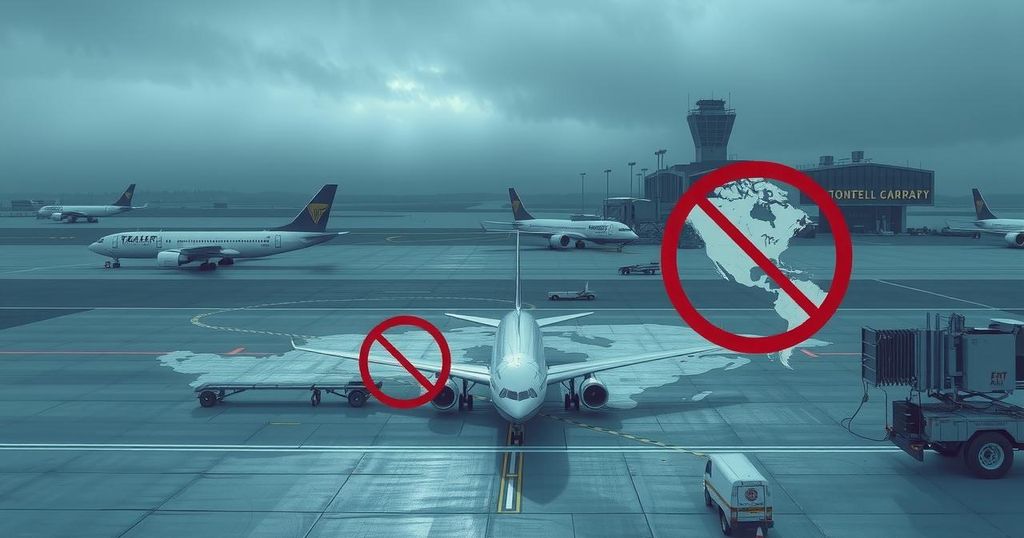Trump Revives Travel Ban, Impacting International Mobility and Tourism Industry
President Trump revives a sweeping travel ban affecting 13 countries, reigniting fears about international mobility and industry disruption. Effective Monday, this ban imposes strict entry restrictions and implies significant economic and diplomatic consequences. The travel industry, students, and families are hugely impacted as preparations begin to mitigate the fallout.
In a striking move reminiscent of previous restrictions, President Donald Trump has revived a sweeping travel ban affecting numerous countries. This sharper, expanded policy has come into play, prompting widespread concern about its implications on global mobility. Effective early Monday, travelers from 13 nations face a full entry ban, while others encounter heightened scrutiny. The repercussions for airlines, airports, and international relations are set to be significant as major industry players scramble to respond to the new regulations.
The travel ban specifically targets Afghanistan, Burma, Chad, Republic of the Congo, Equatorial Guinea, Eritrea, Haiti, Iran, Libya, Somalia, Sudan, Yemen, and Syria. Meanwhile, travelers from Burundi, Cuba, Laos, Sierra Leone, Togo, Turkmenistan, and Venezuela are subject to intensified restrictions. The administration argues that these measures are rooted in national security, but critics are concerned about the broader economic and humanitarian implications following this sudden policy shift.
Airports across the United States braced for potential chaos as memories of the previous travel ban linger in public consciousness. Carriers are already dealing with a barrage of flight changes due to rapid cancellations and rebookings stemming from the ban. Immigration officers are being rapidly re-trained on the new protocols, anticipating a surge in passenger scrutiny.
The tourism sector, especially vulnerable, could feel the impact acutely. Tourism from the affected countries may not seem significant individually, but collectively, they contribute to vital niche markets such as visiting friends and relatives (VFR) and other cultural exchanges. Agencies that rely on these segments, particularly in metropolitan areas, are now facing an uncertain summer season and must adjust fast to avoid losses in revenue.
With countries facing restrictions likely to respond—potentially with their own bans or measures against U.S. nationals—diplomatic ties are at risk. Stakeholders including universities and cultural organizations have expressed alarm over the implications for educational programs and humanitarian efforts, raising the specter of long-term damage.
Legal scrutiny is also expected, with advocacy groups gearing up to challenge the new travel restrictions in court. Past versions of Trump’s travel ban have seen their legality debated extensively, suggesting that this proclamation could meet a similar fate in the judicial arena. The current political landscape adds more complexity, as national security concerns intertwine with a polarized discussion around immigration.
Travel advisors face the dual challenge of managing client expectations amid the uncertainty of the ban. Booking platforms must adapt quickly, updating policies and alerting users to changing regulations. In essence, travel planning has shifted dramatically from leisure to emergency management, especially for those dealing with the fallout of the ban.
The human element in this story cannot be overstated—the students, families, and professionals affected by the reinstated travel restrictions are experiencing significant emotional tolls. Their stories underscore the complexities of travel, where policy decisions impact lives directly, often unseen in the bureaucratic shuffle.
In closing, this renewed travel ban is more than just a national concern; it signals a shift towards greater barriers in global travel. The ramifications for the travel industry at large could be profound, prompting a reevaluation of how cross-border travel is handled in an increasingly divided world. As the dust begins to settle, one thing stands out: the upcoming summer will be defined not just by the trips taken, but by those denied.
The reintroduction of the travel ban by President Trump highlights significant concerns regarding international mobility, economic impacts on the travel industry, and potential diplomatic fallout. With critical sectors scrambling to adapt, this policy reignites fears reminiscent of earlier bans and raises pressing questions about the future of travel in an increasingly disorderly global landscape. As various stakeholders brace for the repercussions, the human costs of these decisions might be the most profound yet.
Original Source: www.travelandtourworld.com




Post Comment